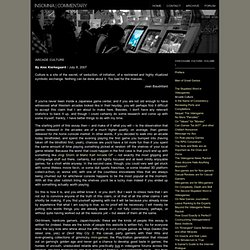

Fanbois treat criticism of favorite brands as threat to self-image - Nightly. Have you ever found yourself frothing at the fingertips while explaining why someone doesn't deserve to use an iPhone because of their deeply flawed sense of aesthetics?

Have you been the type to declare that those who don't use Android are cylons who are under mind control from Cupertino? Or are you Peter Bright, turning up your nose at all of us while you wax on about the unappreciated genius of the Windows 7 Phone? You may think you're defending your favorite platform because it's just that good. But, according to a recently published study out of the University of Illinois, you may instead be defending yourself because you view criticisms of your favorite brand as a threat to your self image.
The study, which will be published in the next issue of the Journal of Consumer Psychology, examines the strength of consumer-brand relationships, concluding that those who have more knowledge of and experience with a brand are more personally impacted by incidents of brand "failure. " Arcade Culture. Arcade Culture By Alex Kierkegaard / July 8, 2007 Culture is a site of the secret, of seduction, of initiation, of a restrained and highly ritualized symbolic exchange.

Nothing can be done about it. Too bad for the masses... Jean Baudrillard If you've never been inside a Japanese game center, and if you are not old enough to have witnessed what Western arcades looked like in their heyday, you will perhaps find it difficult to accept this claim that I am about to make here. The starting point of this essay then -- and make of it what you will -- is the observation that games released in the arcades are of a much higher quality, on average, than games released for the home console market. So this is how it is, and you either know it, or you don't. Old-timers, hardcore gamers, Japan-hounds: these are the kinds of people this essay is written for (indeed, these are the kinds of people this website is written for).
And that is not unfortunate. Not a pretty picture, is it? Play R-Type Final. Another view of game piracy. We've been hearing a lot about game piracy recently, with big developers inflicting draconian online-only DRM systems on their users, and blaming their declining PC game sales entirely on piracy.

I'm not questioning that piracy is common, since even honest, DRM-free, indie developers like 2DBoy[1] report a 90% piracy rate. I am, however, questioning what this means. How much revenue are developers actually losing to piracy? The common industry assumption is that developers are losing 90% of their revenue. That is, pirates would have bought every single game that they downloaded. This means that to calculate the worst-case scenario of how much money is lost to piracy, we just need to figure out what percentage of the target market consists of pirates. iPhone piracy The answer is simple -- the average pirate downloads a lot more games than the average customer buys. Let's consider the following scenario. PC game piracy Does this also apply to PC (Windows/Mac/Linux) gamers?